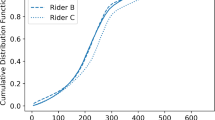Abstract
Research has not found its way yet to the track cycling madison discipline. Currently, training files are collected from cycling computers, after which the data is interpreted in a mainly subjective manner, based on the domain knowledge of a coach. The goal of this paper is twofold. Starting with the automated detection of madison handslings from cadence, acceleration and gyroscope data, all other data corresponding to a single handsling can easily be obtained. The second goal concerns the calculation of statistics on rider performances during a handsling. We present two madison handsling performance assessment use cases. The first use case exposes imbalances within a madison rider pair, whereas the second use case employs power data to monitor the effort a single rider puts into the handsling.
Access this chapter
Tax calculation will be finalised at checkout
Purchases are for personal use only
Similar content being viewed by others
References
Kholkine, L., De Schepper, T., Verdonck, T., Latré, S.: A machine learning approach for road cycling race performance prediction. In: Brefeld, U., Davis, J., Van Haaren, J., Zimmermann, A. (eds.) MLSA 2020. CCIS, vol. 1324, pp. 103–112. Springer, Cham (2020). https://doi.org/10.1007/978-3-030-64912-8_9
Ofoghi, B., Zeleznikow, J., MacMahon, C., Dwyer, D.: A machine learning approach to predicting winning patterns in track cycling omnium. In: Bramer, M. (ed.) IFIP AI 2010. IAICT, vol. 331, pp. 67–76. Springer, Heidelberg (2010). https://doi.org/10.1007/978-3-642-15286-3_7
Sakoe, H., Chiba, S.: Dynamic programming algorithm optimization for spoken word recognition. IEEE Trans. Acoust. Speech Signal Process. 26(1), 43–49 (1978)
Underwood, L., Jermy, M.: Determining optimal pacing strategy for the track cycling individual pursuit event with a fixed energy mathematical model. Sports Eng. 17(4), 183–196 (2014). https://doi.org/10.1007/s12283-014-0153-3
Verstockt, S., et al.: Data-driven summarization of broadcasted cycling races by automatic team and rider recognition. In: icSPORTS 2020, the 8th International Conference on Sport Sciences Research and Technology Support, pp. 13–21 (2020)
Author information
Authors and Affiliations
Corresponding author
Editor information
Editors and Affiliations
Rights and permissions
Copyright information
© 2022 The Author(s), under exclusive license to Springer Nature Switzerland AG
About this paper
Cite this paper
Steyaert, M., De Bock, J., Verstockt, S. (2022). Sensor-Based Performance Monitoring in Track Cycling. In: Brefeld, U., Davis, J., Van Haaren, J., Zimmermann, A. (eds) Machine Learning and Data Mining for Sports Analytics. MLSA 2021. Communications in Computer and Information Science, vol 1571. Springer, Cham. https://doi.org/10.1007/978-3-031-02044-5_14
Download citation
DOI: https://doi.org/10.1007/978-3-031-02044-5_14
Published:
Publisher Name: Springer, Cham
Print ISBN: 978-3-031-02043-8
Online ISBN: 978-3-031-02044-5
eBook Packages: Computer ScienceComputer Science (R0)




